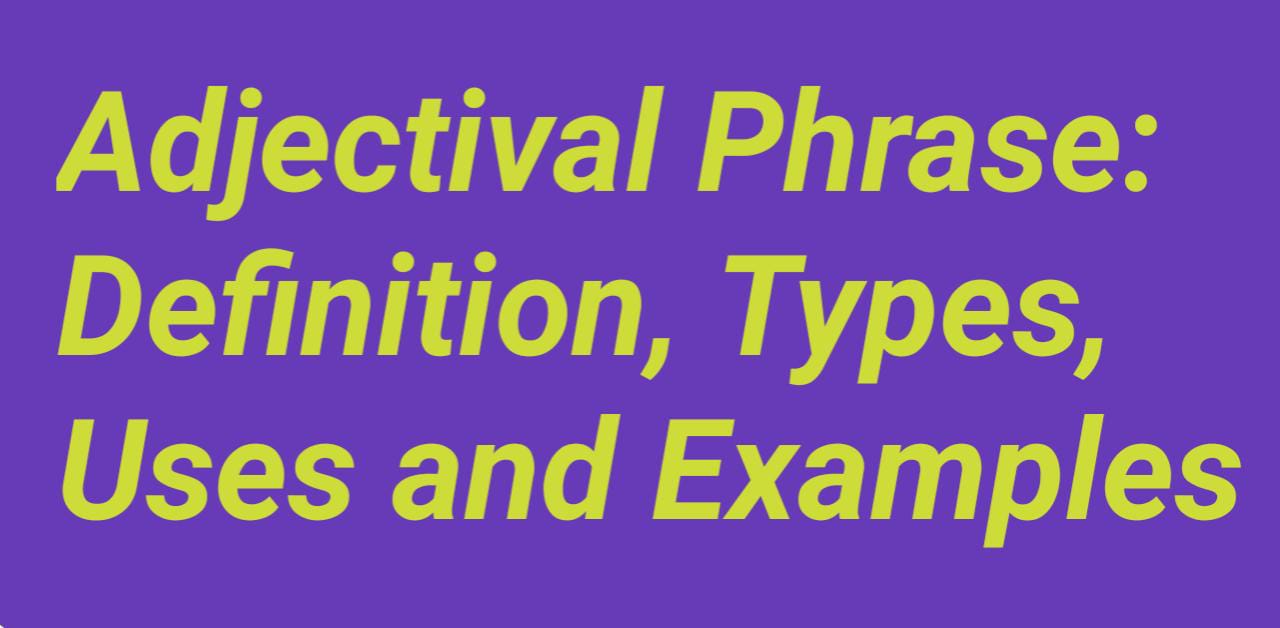Adverbial Phrase - Definition, Types and Examples
Adverbial Phrase - Definition and Meaning
According to Dictionary, An adverbial phrase is "a group of two or more words that function together as an adverb, as the phrase in a minute in "I'll be with you in a minute.".
From the definition above, we learn that:
1. An adverbial is a type of phrase.
2. An adverbial phrase is a group of two or more words.
3. An adverbial phrase functions as an adverb.
Adverbial Phrase Examples
a. Sit there in the class.b. As a student of spoken English, you need to speak English every day. c. Sofia speaks French very well.
In example (a), the prepositional phrase in the class, in example (b), the noun phrase every day and in example (c), very well are adverbials or adverbial phrases that function as adverbs of place, time and manner respectively. How to Identify an Adverbial Phrase?
Identifying an adverbial phrase is as easy as identifying an adverb in a sentence. Like an adverb, an adverbial phrase answers why, where, when, how and how often an action takes place.
Adverbial phrase answering why:
Due to an internal issue, the department announced a seven-day leave.
In the example above, the phrase in bold is an adverbial phrase that answers why the department announced the leave. The answer is due to an internal issue.
Adverbial phrase answering where:
I'll catch you at the bus stop.
In the example, the phrase at the bus stop is an adverbial that answers where I'll catch you. The answer is at the bus stop.
Adverbial phrase answering when:
I'll be there in the classroom in ten minutes.
In the example, the phrase in bold is an adverbial phrase that answers when I'll be there in the classroom. The answer is in ten minutes,
Adverbial phrase answering how:
Sofia speaks German very well.
The phrase very well in the example is an adverbial phrase that answers how Sofia speaks German. The answer is very well.
Adverbial phrase answering how often:
This meeting is conducted every week.
The phrase every week is an adverbial phrase answers how often the meeting is conducted. The answer is every week.
Adverbial Phrase Vs Adverb Phrase
An adverbial phrase, as has been mentioned earlier, is a group of words that acts as an adverb, whereas an adverb phrase is a word or a group of words containing an adverb as its head.
Features of Adverbial and Adverb Phrases
1. Both adverbial phrase and adverb phrase describe a verb or verb phrase.
2. Both adverbial phrase and adverb phrase answer why, when, where, how and how often.
3. An adverbial phrase is a phrase which means it contains at least two words, whereas adverb phrase can be of one word, only adverb or can be a group of words.
4. Adverbial phrase is general, whereas an adverb phrase is specific.
5. Adverbial phrase need not necessarily contain an adverb, whereas an adverb phrase must contain an adverb.
Types of Adverbial Phrase and Examples
a. Adverbial phrase of time: Adverbial phrase of time shows time and answers when an action happened, happens or will happen as in "I'll meet you on Saturday.".
b. Adverbial phrase of place: Adverbial phrase of place shows place and answers where an action happened, happens or will happen as in "The teacher asked the students to gather at the common hall.".
c. Adverbial phrase of manner: Adverbial phrase of manner shows manner and answers how an action happened, happens or will happen as in "John runs very fast.".
d. Adverbial phrase of frequency: Adverbial phrase of frequency shows frequency of an action and answers how often it took place, takes place or will take place as in "The university debating club conducts its session every alternate day.".
Adverbial Phrase Exercises
Choose the adverbial phrases and identify their types.
1. She goes to school every day with her friend. 2. This special meeting is held every year. 3. Owing to heavy rain, the students couldn't attend yesterday's class.4. I'll meet you at 1 o'clock on Sunday. 5. As soon as he the lion, he ran away very quickly. 6. John is going to complete his assignment by tomorrow morning. 7. He has been reading the Arabian Nights for two hours.
Answer keys: 1. every day (noun phrase acting as an adverb) 2. every year (noun phrase acting as an adverb) 3. owing to heavy rain (prepositional phrase acting as an adverb) 4. on Sunday (prepositional phrase acting as an adverb) 5. very quickly (adverb phrase) 6. by tomorrow morning (prepositional phrase acting as an adverb) 7. for two hours (prepositional phrase acting as an adverb)
FAQs (Frequently Asked Questions)
What is an adverbial phrase example?
An adverbial phrase is a group of words that functions as an adverb. Adverbial phrases sometimes contain an adverb as in "John speaks English very well." and some other times, they don't contain an adverb as in "He has been reading this for two hours."

















